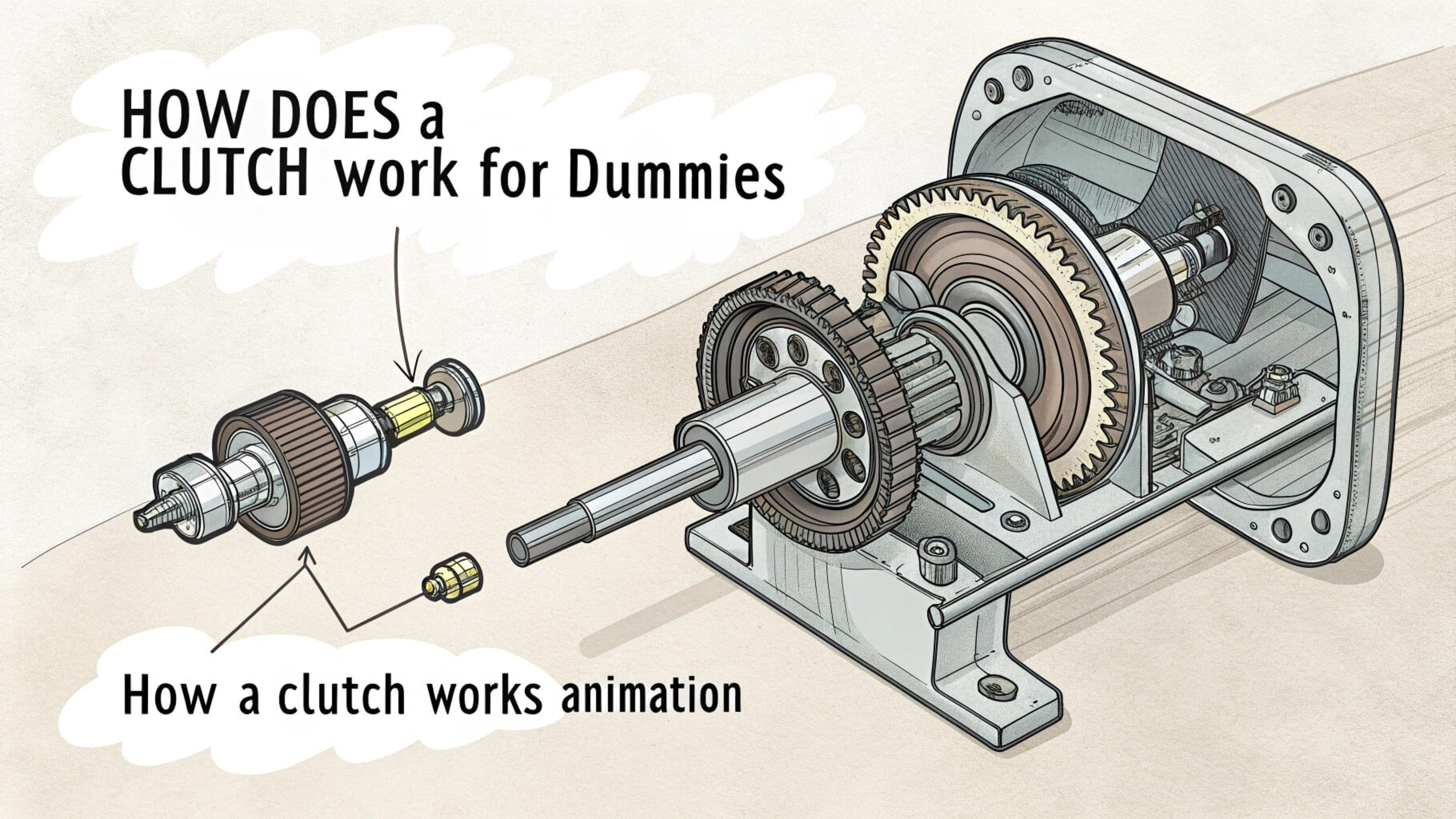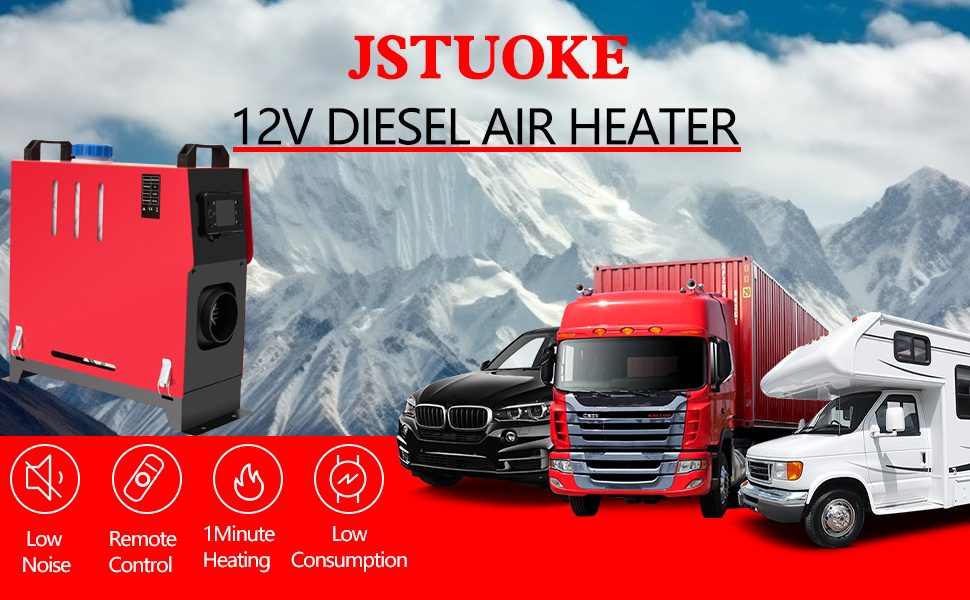The convenience of parking heaters with remote controls is unmatched, but are they truly efficient?
A diesel parking heater with a remote control uses minimal electricity, making it an energy-efficient solution for vehicles in cold climates.
Discover how this technology works and whether it's the right fit for you.
How much electricity does a diesel parking heater use?
Diesel parking heaters claim to be efficient, but what is their true energy consumption? A diesel parking heater typically uses between 10-30 watts of electricity during operation, depending on the model and features. This range can vary based on the specific design and functionality of the heater.
Exploring Energy Efficiency
When evaluating diesel parking heaters, energy usage depends on several factors. Models like the Triclicks Diesel Heater Manual provide detailed specifications, ensuring customers can optimize performance. Most diesel heaters only use a small current for startup and fan operations, making them ideal for off-grid scenarios.
| Heater Type | Electricity Usage (Watts) | Suitable Applications |
|---|---|---|
| Small parking heater with remote control | 10-20 | Personal vehicles, small spaces |
| Portable parking heater with remote control | 15-30 | Mobile homes, outdoor work areas |
| Electric parking heater with remote control | 20-40 | Stationary setups with higher demands |
For those seeking efficiency, the Maxpeedingrods Diesel Heater Manual is worth considering. Pairing these devices with the Bluetooth Diesel Heater Controller enhances usability and reduces unnecessary energy loss.
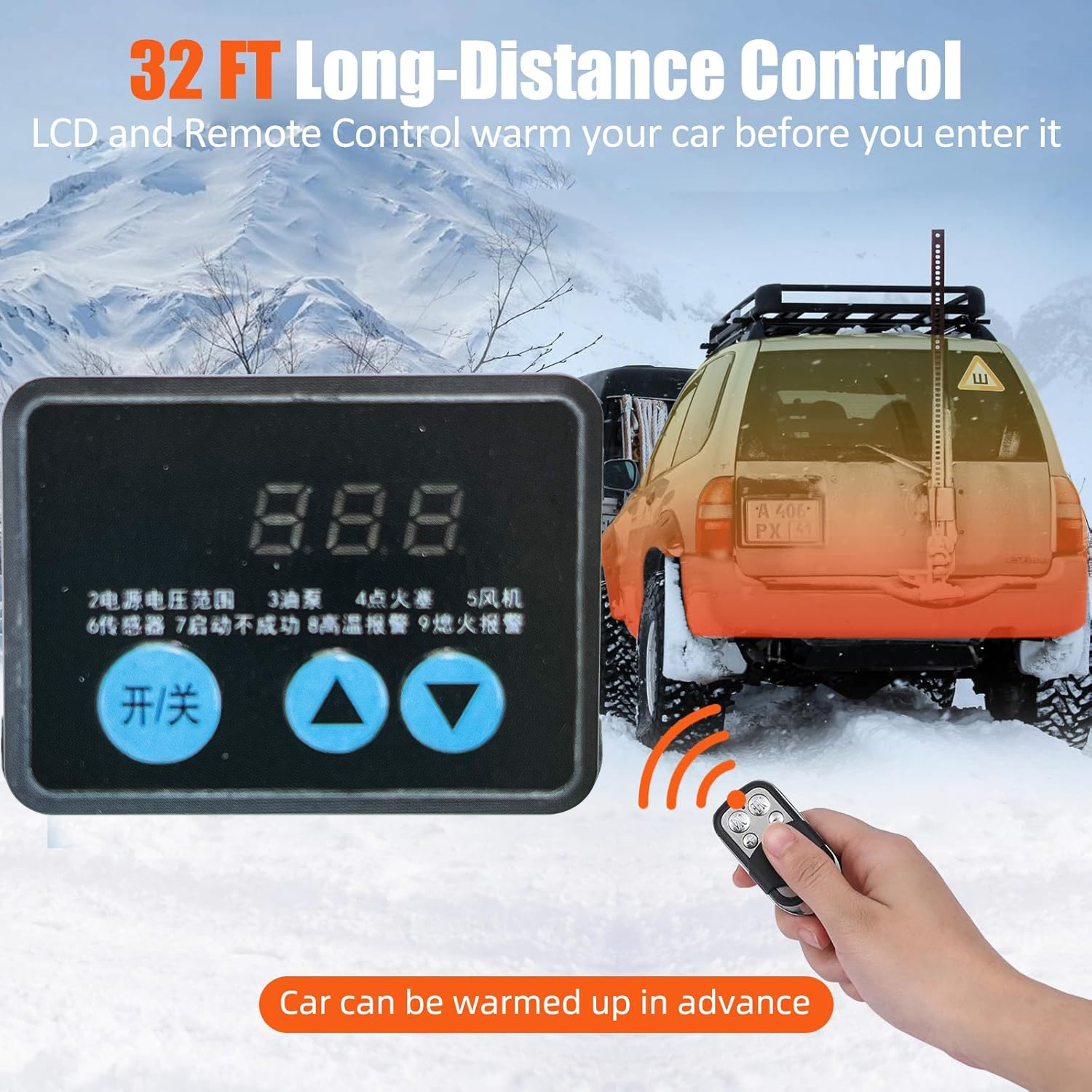
How Much Power Does a Diesel Heater Use?
Let’s dig into the numbers in more detail here and look at how much power diesel heaters actually use. The heater’s power use will depend on its size, but generally, diesel heaters will use 8 to 12 amps during start-up, with some models then requiring as little as 0.5 amps to run continuously, and an average of 1-2 amps. Using a 12V power source, this equates to roughly 96–120W of start-up power, and then about 24Wh after that
. Factors affecting the heater's power usage include the age of the heater, its condition, and the temperature outside. For example, if you're using an older or poorly maintained heater in very cold temperatures, it may require more power than usual. One of the key advantages of diesel heaters is that they don't use a lot of power when running, although they draw a lot of current when starting up. This means that if you're using a car battery (or better yet, a portable power station), it can manage the load effectively
Key Takeaways
- Startup Power: The initial draw is high due to the glow plug heating up the combustion chamber.
- Continuous Power: Once the heater stabilizes, it consumes far less power, primarily to run the fan and fuel pump.
- Total Power Usage: Over a 24-hour period, these heaters consume around 18-24 Ah, making them a manageable load for most van battery systems
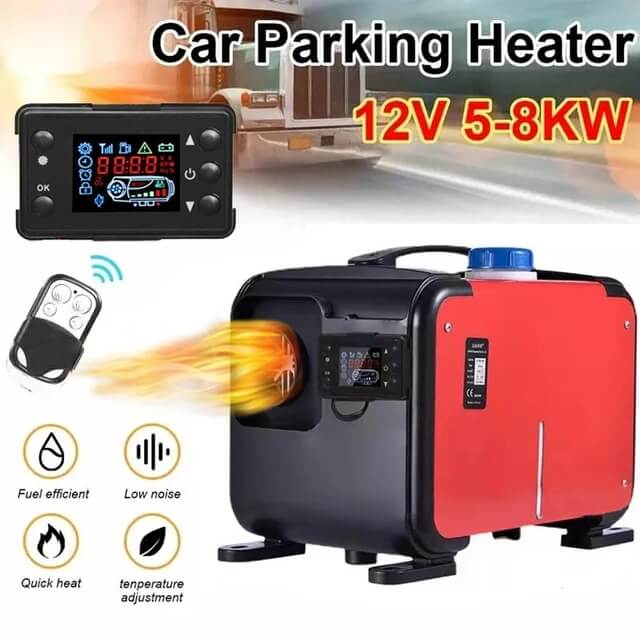
How does a parking heater work?
Ever wonder how parking heaters generate warmth in cold conditions? Parking heaters function by burning fuel or using electricity to produce heat, which is circulated inside the vehicle or space.
Breaking Down the Technology
Parking heaters use a simple yet efficient mechanism. Diesel-powered heaters combust fuel to generate heat, which a fan then circulates. Electric heaters, like those in the Chinese Diesel Heater with Bluetooth, rely on electrical energy to warm the air directly.
Key Components of Parking Heaters:
- Combustion Chamber: Burns diesel fuel.
- Heat Exchanger: Transfers heat from combustion to the air.
- Fan: Circulates heated air into the cabin or space.
Advanced models, such as the Maxpeedingrods Diesel Heater App, offer app control, enabling users to start or adjust heating remotely. These features cater to convenience and customization.
How Parking Heaters Operate
The working principle of the parking heater involves extracting a small amount of fuel from the fuel tank to the combustion chamber. The fuel is then burned in the combustion chamber to generate heat, which heats the air in the cabin and simultaneously warms the engine
. When activated, the process includes several stages:
- Air Intake: The fan draws in air.
- Fuel Injection: The fuel pump delivers diesel to the combustion chamber.
- Ignition: The ignition system ignites the fuel.
- Heat Exchange: The generated heat is transferred to the air via a heat exchanger.
- Air Circulation: The fan distributes warm air into the vehicle's interior.
This system not only preheats the cabin but also ensures that the engine is warmed up before starting, reducing wear during cold starts
Benefits of Parking Heaters
Parking heaters provide several advantages:
- Comfort: They allow for a warm vehicle interior before entry, enhancing comfort during cold weather.
- Engine Efficiency: By preheating the engine, they reduce wear and tear and improve starting efficiency in low temperatures.
- Fuel Efficiency: They consume less fuel compared to idling engines for warmth, resulting in lower emissions and reduced environmental impact
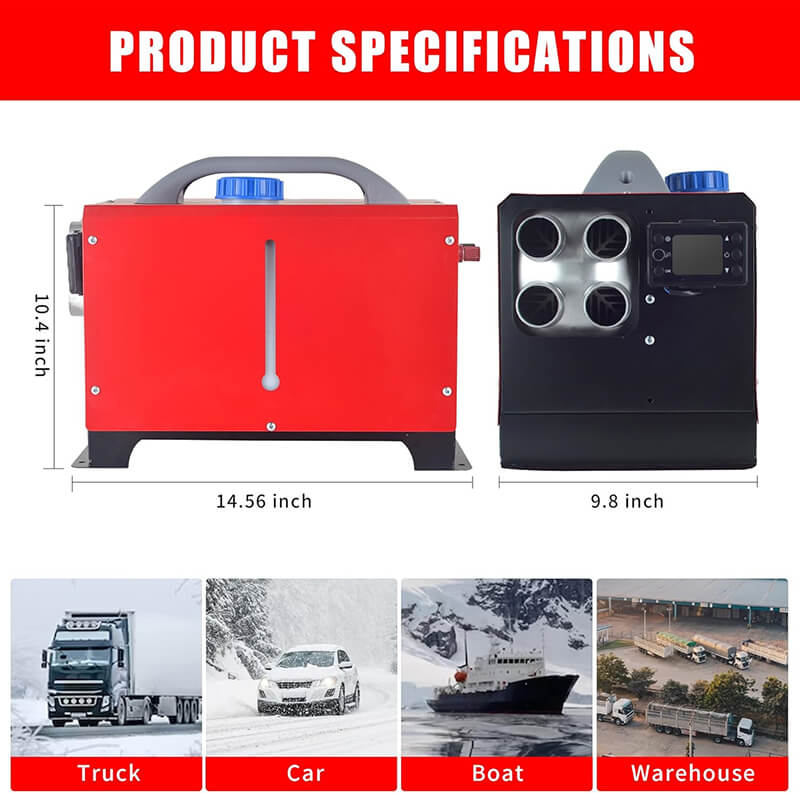
Are diesel heaters legal in the UK?
Regulatory compliance is vital for safe and legal operations. Are diesel heaters permitted in the UK? Diesel heaters are legal in the UK as long as they meet safety and emission standards.
Understanding Legal and Environmental Standards
The UK enforces strict regulations on emissions and safety. Devices like the Small Parking Heater with Remote Control are designed to meet these standards. Manufacturers must comply with certifications such as CE or E-Mark to sell their heaters legally.
| Certification | Requirement Type | Example Product |
|---|---|---|
| CE Certification | General safety compliance | Electric Parking Heater |
| E-Mark Certification | Vehicle-specific standards | Portable Parking Heater |
Compliance ensures diesel heaters are safe and environmentally friendly. However, misuse or incorrect installation can result in issues, so always refer to manuals, such as the Triclicks Diesel Heater Manual.
Additional Considerations
It's important to note that while diesel heaters are generally legal, there are specific regulations regarding the type of fuel used. For instance, red diesel is allowed for domestic heating in the UK, making it a viable option for many users. However, recent changes in regulations may affect its use across different sectors, so staying informed is crucial. Moreover, not all diesel heaters available on the market comply with UK or EU laws and regulations. Many low-cost options may lack necessary safety features or proper certifications, which can pose risks to users. It's advisable to choose products from reputable manufacturers that provide clear documentation of compliance with safety standards, such as those outlined by Trading Standards.
How long can you leave a diesel heater on?
Is it safe to let diesel heaters run for extended periods? Diesel heaters can run continuously for up to 12-24 hours, depending on the fuel tank capacity and settings.
Managing Continuous Operation
Continuous operation depends on fuel efficiency and tank size. A Portable Parking Heater with Remote Control is perfect for intermittent use, while larger models with higher tank capacities allow prolonged heating. Pairing with devices like the Bluetooth Diesel Heater Controller can help regulate usage and prevent overheating.
Pro Tips for Long-Term Use:
- Monitor fuel levels to avoid interruptions.
- Ensure proper ventilation to prevent safety hazards.
- Regularly clean and maintain components for optimal performance.
Reliable options, like the Chinese Diesel Heater with Bluetooth, ensure safe and extended use, catering to diverse needs.
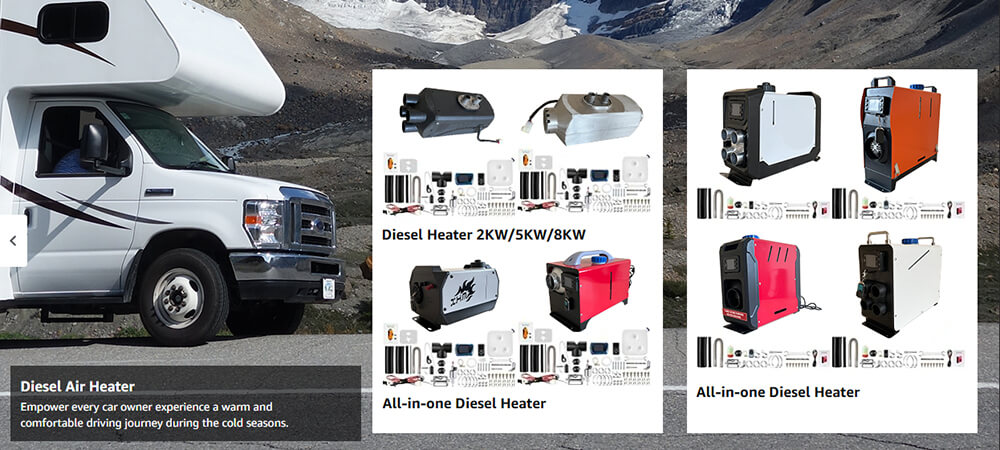
How Long Can a Diesel Heater Run Without Stopping?
The answer to this question depends on several factors. The first is the type of fuel you’re using. If you’re using diesel fuel, it has more energy per gallon than gasoline, so your heater will be able to burn hotter and longer. The second factor is the size of your tank. The bigger the tank, the longer your heater will be able to run without stopping. Generally, a diesel heater will consume about 0.15–0.5 liters of fuel per hour, so this should give you an idea of how long your heating resources will last. Finally, the efficiency of the heater is important; if it isn’t efficient at burning fuel then it won’t be able to run for very long before needing a refill. Generally speaking, most standard-sized diesel heaters can operate for 5-10 hours at full capacity before needing to cool down or refuel.
Can a Diesel Heater Run 24/7?
In theory, yes – a diesel heater can technically run 24/7 since diesel engines don't overheat easily due to their high compression ratio and lower operating temperature compared with gasoline engines. However, there are some risks associated with leaving a diesel heater running all night that should be taken into consideration. For example, if there is no ventilation in the area where the heater is located then carbon monoxide poisoning could occur. This can also cause other risks such as fire hazards and inadequate oxygen levels in enclosed spaces where people are sleeping or living nearby. It's always a good idea to check your manufacturer’s guidelines for operating recommendations for your specific model of diesel heater.
Tips on How to Keep Your Diesel Heater Running All Night
For those seeking out cold-temperature trips, you will probably need to run your heater through the entire night. Here we look at how to optimize night-time use and avoid shutdowns that might disrupt your sleep!
Use High-Quality Diesel Fuel
It is critical to use the highest quality diesel oil for your heater to keep it running efficiently and extend its life. Low-grade diesel fuels contain more sulfur and other contaminants which create carbon build-up. This decreases the fuel’s flammability, reduces the available heat from combustion, and can eventually cause damage to the heater, resulting in expensive repairs – or worse, total replacement. Diesel such as marine-grade or ultra-low sulfur diesel will be free of contaminants and meet industry standards for performance. Spending a few extra dollars on quality fuel now will save you money and headaches down the road.
Conclusion
Parking heaters with remote controls provide unparalleled convenience and efficiency. Here’s a summary of what we covered:
- Diesel heaters use minimal electricity, making them energy-efficient for vehicles.
- They operate by combusting fuel or using electricity to generate heat.
- Diesel heaters are legal in the UK if they meet regulatory standards.
- Models can run for 12-24 hours, depending on capacity and use.
- Advanced features like Bluetooth controllers enhance usability and efficiency.
Investing in a quality parking heater can ensure comfort and reliability. Make sure to choose one that fits your needs.



